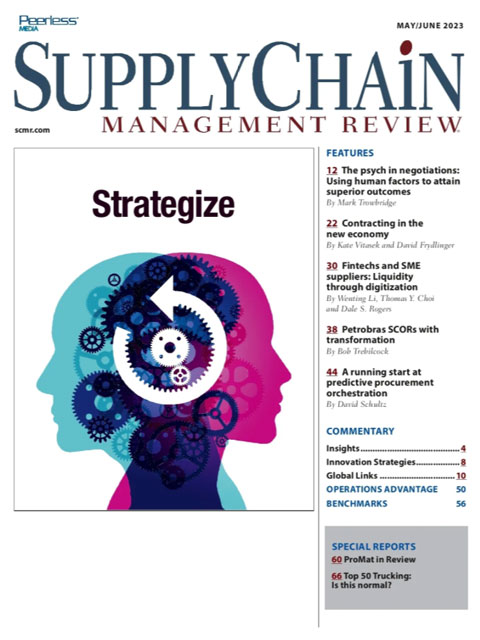Sorry, but your login has failed. Please recheck your login information and resubmit. If your subscription has expired, renew here.
May-June 2023
If you were dropped onto this planet and landed at McCormick Place in the heart of Chicago in the middle of March, you would probably conclude that planet Earth had been overrun by robots. Everywhere you turned on the ProMat conference floor, there was a robot lifting something, putting something away, or carrying something to another location. But, despite a conference hall overrun by technology, the on-the-ground reality is a bit different. Not so long ago, commercial real estate firm Prologis estimated the number of facilities with any type of automation at about 10%. But that is changing—quickly. A recent report from JLL found that one-in-two… Browse this issue archive.Need Help? Contact customer service 847-559-7581 More options
This is a story of what-ifs. Here are 10 to get started.
What if the procurement process could be more: Disciplined. Predictive. Productive. Data dependent. Strategic.
What if the procurement process could be less: Reactive. Time consuming. Costly. Isolated. Uncertain.
That’s a lot of what-ifs, each with the potential for a strong ripple effect across a business. And at Westfall Technik, those what-ifs are powerful outcomes that today are driven by predictive procurement orchestration (PPO). And even though we are still in the early stages of implementing PPO, we know it is the preferred platform for a highly effective and efficient procurement process at Westfall.
But first, a little background. The company is a $350 million roll up of more than 15 injection molding and mold building companies assembled by private equity funds over a five-year span. Westfall molds plastic parts on demand primarily for health care and consumer packaged goods for more than 250 different companies.
In a typical year, the company molds hundreds of millions of parts at a dozen or so locations around the United States. To make those parts, Westfall buys tens of millions of pounds of more than 100 different plastic resins. In many cases, these resins are proprietary blends developed for specific products that Westfall molds for its customers. As you already suspect, all those corporate entities had their own unique procurement processes.
That’s a lot of pressure on an organization like Westfall. There was nothing standardized, streamlined, coordinated or forward looking in the overall procurement process. Did I mention that it was costly and slow, too? The big picture might have even been called undisciplined.
Westfall CEO Mark Gomulka wasn’t having that for long. That’s where I came into the picture in early 2022 with my experience as the chief procurement officer and chief supply chain officer at both public traded and private companies.

This complete article is available to subscribers only.
Log in now for full access or start your PLUS+ subscription for instant access.
SC
MR
Sorry, but your login has failed. Please recheck your login information and resubmit. If your subscription has expired, renew here.
May-June 2023
If you were dropped onto this planet and landed at McCormick Place in the heart of Chicago in the middle of March, you would probably conclude that planet Earth had been overrun by robots. Everywhere you turned on the… Browse this issue archive. Access your online digital edition. Download a PDF file of the May-June 2023 issue.This is a story of what-ifs. Here are 10 to get started.
What if the procurement process could be more: Disciplined. Predictive. Productive. Data dependent. Strategic.
What if the procurement process could be less: Reactive. Time consuming. Costly. Isolated. Uncertain.
That’s a lot of what-ifs, each with the potential for a strong ripple effect across a business. And at Westfall Technik, those what-ifs are powerful outcomes that today are driven by predictive procurement orchestration (PPO). And even though we are still in the early stages of implementing PPO, we know it is the preferred platform for a highly effective and efficient procurement process at Westfall.
But first, a little background. The company is a $350 million roll up of more than 15 injection molding and mold building companies assembled by private equity funds over a five-year span. Westfall molds plastic parts on demand primarily for health care and consumer packaged goods for more than 250 different companies.
In a typical year, the company molds hundreds of millions of parts at a dozen or so locations around the United States. To make those parts, Westfall buys tens of millions of pounds of more than 100 different plastic resins. In many cases, these resins are proprietary blends developed for specific products that Westfall molds for its customers. As you already suspect, all those corporate entities had their own unique procurement processes.
That’s a lot of pressure on an organization like Westfall. There was nothing standardized, streamlined, coordinated or forward looking in the overall procurement process. Did I mention that it was costly and slow, too? The big picture might have even been called undisciplined.
Westfall CEO Mark Gomulka wasn’t having that for long. That’s where I came into the picture in early 2022 with my experience as the chief procurement officer and chief supply chain officer at both public traded and private companies.
SC
MR


Latest Supply Chain News
Latest Podcast

 Explore
Explore
Procurement & Sourcing News
- A reshoring history lesson
- Strategic cost savings differ from cutting costs
- Planning fatigue may be settling in
- Inflation, economic worries among top supply chain concerns for SMBs
- April Services PMI declines following 15 months of growth, reports ISM
- Despite American political environment, global geopolitical risks may be easing
- More Procurement & Sourcing
Latest Procurement & Sourcing Resources

Subscribe

Supply Chain Management Review delivers the best industry content.

Editors’ Picks






